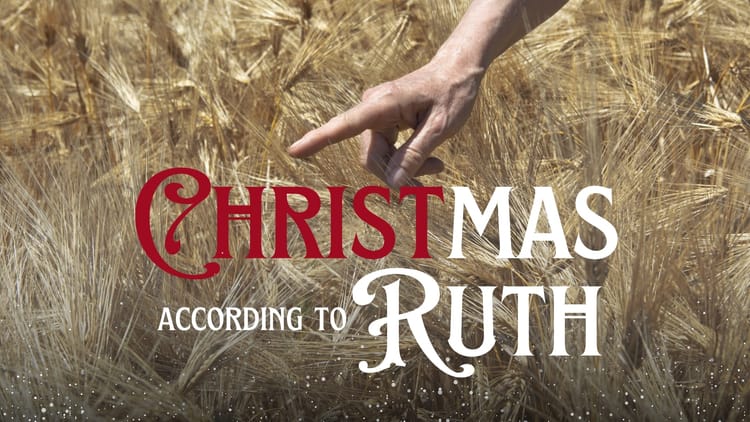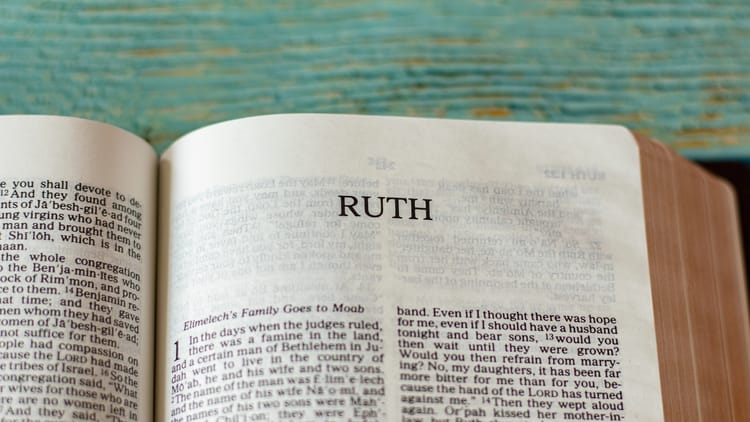Ordinary People and Loyal Love (Ruth)

If I asked you what 2007 was like, I'm sure that I would get a lot of answers, but a couple of answers would probably stand out.
Some of you would probably say that 2007 has been a hard year. I know what some of you have been through this year. It reminds me of the year that Windsor Castle caught on fire and some royal couples split. The Queen called it an annus horribilis. Most of us would just say "horrible year" but it sounds much better in Latin. For some of you, it's been that kind of year.
Some of you wouldn't say it's been particularly hard, but it has been uneventful. Nothing special occurred. Most of life is rather ordinary, and for some of you it may have been one of those really ordinary years.
It's easy to think that hard or ordinary years are a waste of time. It's easy to think that nothing much of value takes place when we are going through hard or mundane times.
I invite you to explore a captivating story today about regular individuals facing difficult times. If you had asked the people in this story if God was at work in their lives, they probably would have said no. But if we understand this story, we'll come to realize that God is often at work when we don't even know it, often preparing to do his greatest work as we just go about our lives not even aware that he's at work all around us.
So if you have your Bibles with you, please look with me at what someone has called one of the greatest masterpieces of narrative art in the Bible: the book of Ruth.
Hard and Ordinary
There are a few things we need to understand as we start this story.
The first thing we need to understand is what things were like at this time. Verse 1 says, "In the days when the judges ruled…" If you were with us this fall in our study through the book of Judges, you know that these were not good times. We looked at Judges and got more and more depressed about what was going on. Israel was at a low point. They abandoned God, lived like all the other nations, and made a mess of things. God kept rescuing them, but they kept on rebelling and things got worse and worse. It was a time of apostasy, degradation, and oppression, a time of rape, incest, and famine. So the story we're about to read was set in very bad times.
In the first chapter we're introduced to Naomi and Ruth. It's important to understand what they were up against. We read in verse 1 that there's a famine in the land. Things get so bad that Naomi and her husband Elimekek have to move to survive. Today, if the economy tanks in Toronto, it's not a huge deal to move to Calgary or Vancouver. But back then moving is a big deal. All the hopes and dreams of Israel were tied to the land. Not only that, but Israelites had a very troubled relationship with Moabites. This would be a big deal. Strike one. But it gets worse.
Elimekek and Naomi have two sons, and both of them marry Moabite women. Strike two. It was extremely important for Israelites not to marry from other nations, not because of racial reasons but because the other nations worshiped other gods. God had said:
Do not intermarry with them. Do not give your daughters to their sons or take their daughters for your sons, for they will turn your children away from following me to serve other gods, and the LORD's anger will burn against you and will quickly destroy you. (Deuteronomy 7:3-4)
But then comes the worst news of all. Naomi's husband dies, and that's hard, but she still has her two sons. But then in verse 5 we read that Naomi's two sons also die. She came to Moab with a husband and two sons, and now all she's left with are two daughters-in-law from a pagan nation. Strike three.
Naomi has lost everything. If any of us lost our entire family it would be devastating, but it still wouldn't be as bad as what Naomi was facing. In Naomi's day, to be a widow meant that you had nothing – no property, no income. You were completely vulnerable, but you could get by if you had children. But Naomi had no surviving children, nobody to support her. On top ofthat,t she's old and won't be able to just pick up and remarry.
It would be like us losing not only our families but our jobs, our savings, our pension fund, and our hope. She's completely exposed. She's experienced famine, premature death, and she has no descendants. Naomi, by the way, is a name that means pleasant. We read in verse 20 that she doesn't want to be called by her name anymore. She says:
Don't call me Naomi," she told them. "Call me Mara [bitter] because the Almighty has made my life very bitter. I went away full, but the LORD has brought me back empty. Why call me Naomi? The LORD has afflicted me; the Almighty has brought misfortune upon me." (Ruth 1:20-21)
As we get to the end of chapter 1, everything is bad.
So: the times are awful, and we have a woman here who has lost everything. But there's one other thing I want you to notice about this story. There are no miracles in this story, no dreams, no angelic visitations. You and I should be able to relate to this story because it is only about ordinary people living mundane – actually, hard – lives. You wonder what God could bring out of a situation like this?
Loyal Love
What happens in this story as Naomi is at her lowest should be encouraging to us. There's a word in Hebrew that is actually my favorite Hebrew word — hesed, which is sometimes translated as kindness or lovingkindness. It's about a graciousness and loyalty that goes beyond all duty, and it's usually shown to somebody who is in need, someone who is experiencing hardship. It's a covenant term that wraps up all the positive qualities of God – covenant faithfulness, mercy, grace, kindness. You can translate hesed as loyal love.
It's something that I see almost every week – I've seen it just this past week, in fact, among ordinary people who are part of Richview. This story shows us what God can do through ordinary people who show loyal love to those around them.
First, Ruth shows this hesed loyal love to her mother-in-law Naomi. When Naomi decides to return to Israel, she knows the best thing to do is to leave her daughters-in-law behind. There would be no future for them in Israel – Moabite women would not be welcome. Naomi could not support them. They would be much better off staying in Moab and remarrying. Naomi has nothing to offer them. One of her daughters-in-law takes Naomi's advice and leaves. But the other one, Ruth, boldly decides to stay with Naomi. She says words that have become famous:
Don't urge me to leave you or to turn back from you. Where you go I will go, and where you stay I will stay. Your people will be my people and your God my God. Where you die I will die, and there I will be buried. May the LORD deal with me, be it ever so severely, if even death separates you and me. (Ruth 1:16-17)
Don't miss what's happening here. One commentator writes:
Ruth stands alone; she possesses nothing. No God has called her; no deity has promised her blessing; no human being has come to her aid. She lives and chooses without a support group and she knows that the fruit of her decision may well be the emptiness of rejection, indeed of death. Consequently, not even Abraham's leap of faith surpasses this decision of Ruth's. And there is more. Not only has Ruth broken with family, country and faith, but she has also reversed sexual allegiance. A young woman has committed herself to the life of an old woman rather than to the search for a husband….One female has chosen another female in a world where life depends upon men. There is no more radical decision in all the memories of Israel. (Word Biblical Commentary)
With no realistic hope of anything good coming out of it, Ruth shows hesed loyal love and casts her lot with Naomi no matter what happens. What will God do with hesed love in a Moabite woman with nothing going for her except that loyal love?
Then we experience another case of hesed love. In those days, the poor and destitute were allowed to pick up the scraps of grain the harvesters had left over. This was allowed, but it would have been risky for Ruth. As a Moabite and as a widow, she could not count on the goodwill of the locals, so she had to find someone who would show her kindness and allow her to do this.
In chapter 2 verse 3 we read that Ruth just happens to pick a field belonging to a man who is very kind. From her perspective, she just chanced upon this field. But it was the field not only of a good and kind man, but he was also a close relative, someone who, it turns out later, can legally buy back the land that belonged to Naomi's family that had been sold. It just so happens!
This man, Boaz, against all odds, institutes the first workplace non-harassment policy in history to protect Ruth, invites her to glean freely behind the harvesters, which would allow her to get more grain. He also authorizes her to drink water from the jars the harvesters had filled. You need to understand that in that culture women normally drew water for men, and foreigners were made to draw water for the Israelites. For Israelite men to draw water for a Moabite woman was extraordinary. He even makes arrangements for the workers to "accidentally" drop some stalks for her to pick up. She ends up with about 30 pounds of grain, an unusual amount for one day's gleaning, all because of the hesed loyal love of Boaz to this Moabite woman with nothing. Naomi even says in verse 20, ""The LORD bless him!…He has not stopped showing his kindness [hesed] to the living and the dead."
Finally, there's the loyal love of Naomi to her daughter-in-law Ruth. In chapter 3, Naomi hatches a plot that could lead to Ruth marrying Boaz, who can provide for the entire family because he has the legal right to buy back the ancestral land because he is a close relative. Ruth actually goes further and proposes marriage to Boaz. In those days, it was shocking for a woman – especially a Moabite woman – to propose marriage to an Israelite man. But that's what happens, because Naomi wants Ruth to be provided for and to have a home. Unbelievably, when Ruth proposes, Boaz says yes. Not only does he say yes but he says:
"The LORD bless you, my daughter," he replied. "This kindness [hesed] is greater than that which you showed earlier: You have not run after the younger men, whether rich or poor. And now, my daughter, don't be afraid. I will do for you all you ask." (Ruth 3:10-11)
There are no miracles here. There is only, at a time that was morally corrupt, hesed loyal love shown between ordinary people.
As the story comes to a close, Boaz overcomes the one remaining obstacle to marrying Ruth. He dissuades a closer relative from exercising his right to buy Naomi's ancestral land. He then marries her, and they have a son. Naomi, who came back empty, now has an heir, someone to provide for her in her old age. But even better, the son that was born to Ruth and Boaz becomes grandfather of the greatest king to rule over Israel in the Hebrew Scriptures, King David.
When we finished the book of Judges, we felt like things were a complete mess. God raised up deliverers and performed miracles, but nothing good seemed to happen. How could God bring anything good out of the time of the Judges? God did bring something good out of the time of the Judges, but it wasn't through miracles. It was through the simple hesed loyal love shown by and to ordinary people, even unlikely people. God does some of his best work through ordinary people who show loyal love to those around him.
But there's more. Ruth and Boaz had a son, and their son became grandfather to the greatest king of the Hebrew Scriptures, King David. But their son also became ancestor of the greatest king to rule ever, the king whose birth we celebrated this past week, Jesus. So we find the names of Boaz and Ruth in Matthew 1, which gives the family tree of Jesus. It was through the hesed love shown among ordinary people that God raised up the Savior of the entire world.
Ordinary Lives Today
I asked you what kind of year 2007 had been for you. I guessed that a lot of you would say that it's been ordinary, maybe hard. For a lot of us, it may look that God has been absent from our lives.
Ruth is a book for people who live ordinary, uneventful lives, maybe even hard lives. Ruth reminds us that God is doing ten thousand things even when he appears to be absent. This is a book for people who look around and see ordinariness. It reminds us that God is at work in ordinary lives among ordinary people as we show loyal love to the people he has placed around us.
Imagine the surprise when Naomi and Ruth discover that God not only rescued them out of emptiness but used them against all odds to send us his Son. Maybe one day we'll be surprised too as we discover what God has been doing in our ordinary lives as we show hesed love to those he has placed around us.
Father, thank you for the way that you work behind the scenes. You are the one who is doing ten thousand things in our lives even when you appear to be absent. Thank you that you are the one who takes emptiness and fills it. You are the one who renews and sustains life. You are the one who takes an impoverished widow her Moabite daughter-in-law, and who through their ordinary lives and their hesed love you establish a royal line that brings the world not only King David, but also the King of all kings.
I pray that we would look to Jesus this morning. I pray that you would allow us to see that he indeed is the reigning King, the one whose birth we celebrate, the one whose return we long for. And as we complete one year and begin another, may we see that you are at work in our ordinary lives as we show hesed loyal love to the ordinary people you have placed around us. In Jesus' name we pray. Amen.





